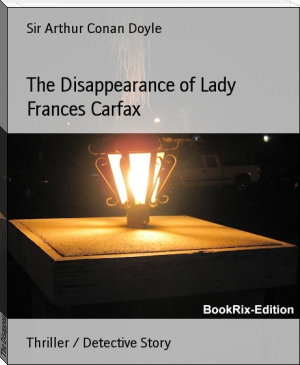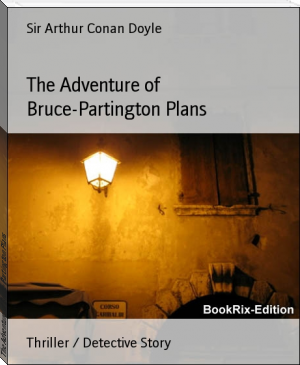His Last Bow - Arthur Conan Doyle (classic books for 12 year olds txt) 📗

- Author: Arthur Conan Doyle
- Performer: -
Book online «His Last Bow - Arthur Conan Doyle (classic books for 12 year olds txt) 📗». Author Arthur Conan Doyle
“Well, I won’t see him, Staples. I can’t have my work
interrupted like this. I am not at home. Say so. Tell him to
come in the morning if he really must see me.”
Again the gentle murmur.
“Well, well, give him that message. He can come in the morning,
or he can stay away. My work must not be hindered.”
I thought of Holmes tossing upon his bed of sickness and counting
the minutes, perhaps, until I could bring help to him. It was
not a time to stand upon ceremony. His life depended upon my
promptness. Before the apologetic butler had delivered his
message I had pushed past him and was in the room.
With a shrill cry of anger a man rose from a reclining chair
beside the fire. I saw a great yellow face, coarse-grained and
greasy, with heavy, double-chin, and two sullen, menacing gray
eyes which glared at me from under tufted and sandy brows. A
high bald head had a small velvet smoking-cap poised coquettishly
upon one side of its pink curve. The skull was of enormous
capacity, and yet as I looked down I saw to my amazement that the
figure of the man was small and frail, twisted in the shoulders
and back like one who has suffered from rickets in his childhood.
“What’s this?” he cried in a high, screaming voice. “What is the
meaning of this intrusion? Didn’t I send you word that I would
see you tomorrow morning?”
“I am sorry,” said I, “but the matter cannot be delayed. Mr.
Sherlock Holmes—”
The mention of my friend’s name had an extraordinary effect upon
the little man. The look of anger passed in an instant from his
face. His features became tense and alert.
“Have you come from Holmes?” he asked.
“I have just left him.”
“What about Holmes? How is he?”
“He is desperately ill. That is why I have come.”
The man motioned me to a chair, and turned to resume his own. As
he did so I caught a glimpse of his face in the mirror over the
mantelpiece. I could have sworn that it was set in a malicious
and abominable smile. Yet I persuaded myself that it must have
been some nervous contraction which I had surprised, for he
turned to me an instant later with genuine concern upon his
features.
“I am sorry to hear this,” said he. “I only know Mr. Holmes
through some business dealings which we have had, but I have
every respect for his talents and his character. He is an
amateur of crime, as I am of disease. For him the villain, for
me the microbe. There are my prisons,” he continued, pointing to
a row of bottles and jars which stood upon a side table. “Among
those gelatine cultivations some of the very worst offenders in
the world are now doing time.”
“It was on account of your special knowledge that Mr. Holmes
desired to see you. He has a high opinion of you and thought
that you were the one man in London who could help him.”
The little man started, and the jaunty smoking-cap slid to the
floor.
“Why?” he asked. “Why should Mr. Homes think that I could help
him in his trouble?”
“Because of your knowledge of Eastern diseases.”
“But why should he think that this disease which he has
contracted is Eastern?”
“Because, in some professional inquiry, he has been working among
Chinese sailors down in the docks.”
Mr. Culverton Smith smiled pleasantly and picked up his smoking-cap.
“Oh, that’s it—is it?” said he. “I trust the matter is not so
grave as you suppose. How long has he been ill?”
“About three days.”
“Is he delirious?”
“Occasionally.”
“Tut, tut! This sounds serious. It would be inhuman not to
answer his call. I very much resent any interruption to my work,
Dr. Watson, but this case is certainly exceptional. I will come
with you at once.”
I remembered Holmes’s injunction.
“I have another appointment,” said I.
“Very good. I will go alone. I have a note of Mr. Holmes’s
address. You can rely upon my being there within half an hour at
most.”
It was with a sinking heart that I reentered Holmes’s bedroom.
For all that I knew the worst might have happened in my absence.
To my enormous relief, he had improved greatly in the interval.
His appearance was as ghastly as ever, but all trace of delirium
had left him and he spoke in a feeble voice, it is true, but with
even more than his usual crispness and lucidity.
“Well, did you see him, Watson?”
“Yes; he is coming.”
“Admirable, Watson! Admirable! You are the best of messengers.”
“He wished to return with me.”
“That would never do, Watson. That would be obviously
impossible. Did he ask what ailed me?”
“I told him about the Chinese in the East End.”
“Exactly! Well, Watson, you have done all that a good friend
could. You can now disappear from the scene.”
“I must wait and hear his opinion, Holmes.”
“Of course you must. But I have reasons to suppose that this
opinion would be very much more frank and valuable if he imagines
that we are alone. There is just room behind the head of my bed,
Watson.”
“My dear Holmes!”
“I fear there is no alternative, Watson. The room does not lend
itself to concealment, which is as well, as it is the less likely
to arouse suspicion. But just there, Watson, I fancy that it
could be done.” Suddenly he sat up with a rigid intentness upon
his haggard face. “There are the wheels, Watson. Quick, man, if
you love me! And don’t budge, whatever happens—whatever
happens, do you hear? Don’t speak! Don’t move! Just listen
with all your ears.” Then in an instant his sudden access of
strength departed, and his masterful, purposeful talk droned away
into the low, vague murmurings of a semi-delirious man.
>From the hiding-place into which I had been so swiftly hustled I
heard the footfalls upon the stair, with the opening and the
closing of the bedroom door. Then, to my surprise, there came a
long silence, broken only by the heavy breathings and gaspings of
the sick man. I could imagine that our visitor was standing by
the bedside and looking down at the sufferer. At last that
strange hush was broken.
“Holmes!” he cried. “Holmes!” in the insistent tone of one who
awakens a sleeper. “Can’t you hear me, Holmes?” There was a
rustling, as if he had shaken the sick man roughly by the
shoulder.
“Is that you, Mr. Smith?” Holmes whispered. “I hardly dared
hope that you would come.”
The other laughed.
“I should imagine not,” he said. “And yet, you see, I am here.
Coals of fire, Holmes—coals of fire!”
“It is very good of you—very noble of you. I appreciate your
special knowledge.”
Our visitor sniggered.
“You do. You are, fortunately, the only man in London who does.
Do you know what is the matter with you?”
“The same,” said Holmes.
“Ah! You recognize the symptoms?”
“Only too well.”
“Well, I shouldn’t be surprised, Holmes. I shouldn’t be
surprised if it WERE the same. A bad lookout for you if it is.
Poor Victor was a dead man on the fourth day—a strong, hearty
young fellow. It was certainly, as you said, very surprising
that he should have contracted and out-of-the-way Asiatic disease
in the heart of London—a disease, too, of which I had made such
a very special study. Singular coincidence, Holmes. Very smart
of you to notice it, but rather uncharitable to suggest that it
was cause and effect.”
“I knew that you did it.”
“Oh, you did, did you? Well, you couldn’t prove it, anyhow. But
what do you think of yourself spreading reports about me like
that, and then crawling to me for help the moment you are in
trouble? What sort of a game is that—eh?”
I heard the rasping, laboured breathing of the sick man. “Give
me the water!” he gasped.
“You’re precious near your end, my friend, but I don’t want you
to go till I have had a word with you. That’s why I give you
water. There, don’t slop it about! That’s right. Can you
understand what I say?”
Holmes groaned.
“Do what you can for me. Let bygones be bygones,” he whispered.
“I’ll put the words out of my head—I swear I will. Only cure
me, and I’ll forget it.”
“Forget what?”
“Well, about Victor Savage’s death. You as good as admitted just
now that you had done it. I’ll forget it.”
“You can forget it or remember it, just as you like. I don’t see
you in the witnessbox. Quite another shaped box, my good Holmes,
I assure you. It matters nothing to me that you should know how
my nephew died. It’s not him we are talking about. It’s you.”
“Yes, yes.”
“The fellow who came for me—I’ve forgotten his name—said that
you contracted it down in the East End among the sailors.”
“I could only account for it so.”
“You are proud of your brains, Holmes, are you not? Think
yourself smart, don’t you? You came across someone who was
smarter this time. Now cast your mind back, Holmes. Can you
think of no other way you could have got this thing?”
“I can’t think. My mind is gone. For heaven’s sake help me!”
“Yes, I will help you. I’ll help you to understand just where
you are and how you got there. I’d like you to know before you
die.”
“Give me something to ease my pain.”
“Painful, is it? Yes, the coolies used to do some squealing
towards the end. Takes you as cramp, I fancy.”
“Yes, yes; it is cramp.”
“Well, you can hear what I say, anyhow. Listen now! Can you
remember any unusual incident in your life just about the time
your symptoms began?”
“No, no; nothing.”
“Think again.”
“I’m too ill to think.”
“Well, then, I’ll help you. Did anything come by post?”
“By post?”
“A box by chance?”
“I’m fainting—I’m gone!”
“Listen, Holmes!” There was a sound as if he was shaking the
dying man, and it was all that I could do to hold myself quiet in
my hiding-place. “You must hear me. You SHALL hear me. Do you
remember a box—an ivory box? It came on Wednesday. You opened
it—do you remember?”
“Yes, yes, I opened it. There was a sharp spring inside it.
Some joke—”
“It was no joke, as you will find to your cost. You fool, you
would have it and you have got it. Who asked you to cross my
path? If you had left me alone I would not have hurt you.”
“I remember,” Holmes gasped. “The spring! It drew blood. This
box—this on the table.”
“The very one, by George! And it may as well leave the room in
my pocket. There goes your last shred of evidence. But you have
the truth now, Holmes, and you can die with the knowledge that I
killed you. You knew too much of the fate of Victor Savage, so I
have sent you to share it. You are very near your end, Holmes.
I will sit here and I will watch you die.”
Holmes’s voice had sunk to an almost inaudible whisper.
“What is that?” said Smith.





Comments (0)